19 Impressive Natural Remedies to Relieve Seasonal Allergies

In my early 20s, I had allergies so terrible that I took two prescription and OTC drugs for them. Now, in my 50s, I have no allergies of any kind and take no drugs, either. Let me share why.
Nearly 20 million Americans are sensitive to the pollen erupting from trees, grasses, and weeds, or the airborne mold spores that thrive when damp and rainy conditions are followed by warmer weather.1
The aggravating symptoms associated with this disorder, commonly referred to as hay fever, include a runny nose, sneezing, and itchy, watery eyes.
Common questions among seasonal allergy sufferers are, “Why do I have allergies? Can seasonal allergies be prevented? What can I do to get relief from seasonal allergies without resorting to medication?”
In order to answer these questions, we need to take a look at the root cause of this all-too-common ailment. Knowing the cause will lead us to the most effective natural treatments for seasonal allergies.
In this post:
- What Causes Seasonal Allergies?
- How Are Seasonal Allergies Treated?
- Best Natural Remedies for Seasonal Allergy Relief
- Food as Medicine
- Allergies & Environmental Factors
- Final Thoughts on Natural Remedies for Seasonal Allergies
What Causes Seasonal Allergies?
The human immune system is designed to protect us from foreign invaders and our own cells that have gone rogue. It does this by recognizing foreign particles, such as bacteria, parasites, viruses, and toxins, and then launching an attack against them.
Innate vs. Acquired Immune System
There are two parts to our immune system: the innate immune system, which consists of cells that surround and kill invaders and is with us from the day we are born, and the acquired immune system, which develops as we age.
This latter system produces special cells called antibodies, which develop once the body is exposed to an invader. After this first exposure, these antibodies recognize and defend against that particular invader.
So, what does this have to do with seasonal allergies? Everything!
When antibodies respond to non-threatening proteins, such as those found in grass pollen, allergies result. These antibodies attach to certain white blood cells known as mast cells, where an inflammatory chemical called histamine is stored. This action initiates histamine release into the bloodstream and produces the symptoms associated with seasonal allergies--the sneezing and watery eyes that are your body’s attempts to rid itself of the allergen.
Pollen season is especially agonizing for allergy sufferers, when the increased exposure to what is now seen as a foreign invader causes the immune response to go into overdrive.
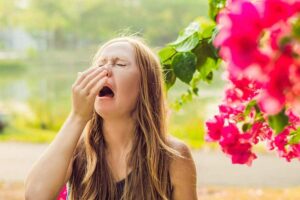
Knowing the cause helps us understand the importance of supporting and maintaining a healthy immune system. Diet, stress, exercise, hormones, and environmental irritants all play a part in either supporting or overloading this all-important system.
How Are Seasonal Allergies Treated?
Mainstream medicine’s approach to treating seasonal allergies is to treat the symptoms.
The standard protocol is treatment with either over-the-counter or prescription antihistamines and decongestants—medicines that, while they may relieve the symptoms, carry side effects of their own, including drowsiness, dizziness, trouble sleeping, nervousness, confusion, headaches, and muscle spasms.
There are likely other long-term side effects, as well. Anytime a human being ingests chemical toxins (and all pharmaceuticals are—or contain—chemical toxins), the immune system is additionally taxed, and more compounding disease states can result.
Holistic health proponents, on the other hand, turn to natural, therapeutic products and lifestyle changes that can help you through the pollen season and build your defenses for a lifetime of health.
I, myself, am a former seasonal allergy sufferer, and I have no symptoms at all anymore after employing a few of the following strategies, including eating a very nutrient-dense diet and detoxing twice a year, to keep my immune system strong.
This article will explore methods for strengthening the immune system and decreasing the Toxic Body Burden (TBB), which often leads to allergies. (TBB can be defined as A [total exposure to chemical toxins] – B [the amount of toxicity your organs of elimination can get rid of] = C [TBB].)
Here, then, are some of the best natural remedies for seasonal allergies.
Best Natural Remedies For Seasonal Allergy Relief
Probiotics and Prebiotics
Did you know that 70 to 80% of your immune tissues are located in your gut?2
Supporting these immune cells in the gut are certain strains of beneficial gut flora, the “good bacteria” essential for health. A diet rich in unprocessed foods, such as fruits and vegetables, encourages the growth of these bacteria.
Prebiotics and probiotics are powerful immune boosters that also support healthy intestinal flora. Probiotics are cultures of live beneficial bacteria that include Lactobacillus acidophilus and Bifidobacterium bifidum and infantis.
Prebiotics are a type of undigestible plant fiber and a food supply for probiotics and the good guys in the bacteria flora. While foods that are high in fiber are also often high in prebiotics, not all are fermentable in the colon which makes them probiotic feed.
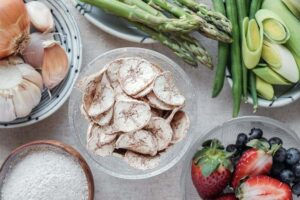
Antibiotics, of course, kill off the beneficial bacteria as well as the unhealthy bacteria, leaving the immune system vulnerable. A study conducted at the University of Michigan revealed that mice who were fed antibiotics and then exposed to allergens such as pollen, dander, and dust mites experienced allergy-like symptoms that they had never had before.4
Another study conducted by the National Institutes of Health found that a lack of diversity in gut microbes was associated with seasonal allergies.5
A good prebiotic and probiotic supplement will combine the two, will be plant-based, and have at least 12-15 strains of probiotics to diversify and help populate gut flora.
[Related: What To Do After You’ve Taken Antibiotics]
Fermented Foods
Fermented foods, such as sauerkraut, kefir, Rejuvelac, kimchi, and yogurt, are rich sources of probiotic bacteria. A fermented tea known as kombucha has become popular in recent years, but nearly all kombuchas have far too much sugar, which causes inflammation and can even worsen seasonal allergies.
I like to use water kefir grains to ferment coconut water. This is what I use as the base for my smoothies; it’s easy to make overnight, has no sugar, and the grains can be used over and over.
There are plenty of other cultured foods you can learn to make for a healthy gut, but this is an easy method I have used for 20 years now.
[Related:How To Make Kefir]
Fulvic Acid Supplement
Studies show that kids who grow up on farms and have pets have fewer allergies.6 This finding correlates with the hygiene theory—that children who are not exposed to dirt and organisms will not develop appropriate immune responses. It also leads us to an interesting compound that dwells in soil—fulvic acid.
Fulvic acid, which is released when organic matter decomposes, contains numerous vitamins, minerals, flavonoids, fatty acids, and pro- and prebiotics. Several studies report on fulvic acid’s anti-inflammatory and anti-allergy effects.7
Unfortunately, because of the depleted soil in which our fruits and vegetables are grown, and the fact that few of us live in an environment that allows us to get our hands deep into the earth’s soil, many of us are depleted in the rich minerals and nutrients this compound provides.

Look for a quality fulvic acid supplement that is combined with humic acid, which aids the good bacteria in the colon.
Beta Glucan
Beta glucan is a form of dietary fiber found in barley, oats, yeasts, and algae, as well as some mushrooms such as maitake and reishi. It is one of the most studied and exciting compounds found in nature!
In fact, thousands of studies reveal its well-known health benefits, such as strengthening the immune system and improving cholesterol levels.
In addition, studies show that beta glucan also reduces the symptoms associated with allergies. When participants received beta glucan supplementation for four weeks, over 50% showed reduced severity in allergy symptoms. As an added benefit, participants also noted a decrease in depression, anger, and fatigue.8
My family and I have personally experienced the benefits of this remarkable compound. We turned to beta glucan when we found out that my son was allergic to cats. His allergy was so bad that we had to return the kitten we had just brought home. A few weeks later, after taking beta glucan, we were able to reunite with the kitty, and Tennyson has been free of allergies ever since!
Garlic
You may have turned to garlic during cold and flu season for its potent immune boosting effects. What you may not know is that garlic is rich in quercetin, a naturally histamine-lowering flavonoid that is a key ingredient in many anti-allergy supplements and drugs.9
Eating garlic or drinking it in a tonic are good ways to get its benefits, but if you don’t consume it daily, you may want to consider a quality supplement. My favorite for many years has always been Kyolic garlic.
Butterbur
Butterbur, also known as blatterdock, is becoming increasingly popular as the herb of choice for those suffering from the symptoms associated with allergies.
One study conducted by a group of Swiss researchers found that one tablet of butterbur extract was as effective as a popular antihistamine drug in controlling symptoms, without the participants experiencing the drowsiness associated with antihistamine drugs.10
Butterbur, derived from a shrub that grows in Europe, Asia, and North America that boasts three-foot diameter leaves, can be taken as an oil extract or in pill form.
Freeze-Dried Stinging Nettle
Stinging nettle is a prolific edible weed that grows around the world, including North America, and is known for its anti-inflammatory and anti-allergy effects. It has been used to treat many disorders since the days of Ancient Greece.
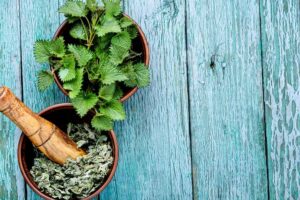
This herb is highly regarded for reducing the effects associated with hay fever, due, in part, to its ability to reduce the amount of histamine the body releases in response to an allergen.
It’s important to select a high-quality product that has been freeze-dried, which helps retain the plant’s active ingredients while deactivating the irritant compound that delivers the “sting.”
A study published in the Iranian Journal of Pharmaceutical Research found that those participants who received doses of stinging nettle experienced a reduction in their allergy symptoms. Researchers believe that this herb may provide long-term benefits and reduced allergic reactions over time.11
Vitamin C
Vitamin C has been linked to anti-cancer, immune-enhancing, heart-healthy effects and is also responsible for preventing the formation of histamine and slowing down your body’s overreaction to environmental triggers.
A study conducted on 25 hay fever sufferers during ragweed season showed the following:
- Participants showed little to no relief after taking 100 mg of vitamin C for one week.
- Those that increased their intake of vitamin C to 200 mg daily reported great relief to “No hay fever at all—after years of suffering.”
- Only three individuals reported no relief. One of these upped their dose to 500 mg and reported that their hay fever was practically gone after 3 days.12
Note: if you plan on taking a Vitamin C supplement, make sure you take a natural one made from food rather than ascorbic acid, which may be harmful to your health.
Those are just a few of the many natural supplements that people have been taking for years to combat and prevent the effects of seasonal allergies. In addition to vitamins, minerals, and herbal remedies, making changes in your diet can also prompt relief.
Food as Medicine
As a whole-foods activist, I view food as medicine. Your body, after all, is designed to obtain its nutritional needs from your diet. Supplements just can’t replicate all of the complex micronutrients operating synergistically, found in antioxidant-rich whole foods such as fruits and vegetables.
So let’s take a look at what foods you should include in a diet designed to put an end to your seasonal allergies.
Foods that Support a Healthy Liver
Did you know that your liver plays a big role in reducing the effects of seasonal allergies? As the main purifier of our bodies, it filters about two quarts of our blood every minute.
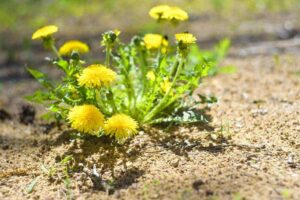
Dandelion greens are considered a tonic for the liver. Traditionally used by Native Americans, it remains one of the top medicinal herbs for strengthening the liver and stimulating the flow of bile. These greens are a great addition to salads, sauteed with onions and garlic, or as an addition to a delicious smoothie.
[Related: 12 Delicious Edible Weeds To Forage For Green Smoothies And More]
Fun fact: The milky sap that comes from the stem of the dandelion has been used for hundreds of years as a topical treatment for warts.
Diets that support a healthy liver also include foods high in glutathione, an antioxidant that helps detoxify the liver. Foods high in this compound include beets, carrots, tomatoes, grapefruit, spinach, and walnuts. A great way to get a good dose of carrots, beets, and strawberries (high in vitamin C) is the Hot Pink Breakfast Smoothie—my all-time favorite breakfast.
Foods Rich in Vitamin C
In addition to strawberries, you’ll find this important vitamin in citrus fruits, kiwis, papayas, tomatoes, cantaloupes, and bell peppers.
Foods High in Quercetin
I touched briefly on the benefits of quercetin when touting the health effects of garlic. Quercetin is a bioflavonoid found in other foods as well such as apples, onions, cabbage, cauliflower, broccoli, and berries.
Its importance in the world of seasonal allergies lies in its ability to prevent your body from releasing histamine and, as a potent antioxidant, stimulating your immune system. Research has proven both its anti-inflammatory and anti-allergic properties.13
Local Raw Honey
The idea here is that when a person eats local raw honey, they're ingesting small amounts of local pollen. Over time, a person may become less sensitive to this pollen and experience fewer seasonal allergy symptoms.
Evidence for this benefit of raw honey is anecdotal, but my family stopped experiencing seasonal allergies after a couple of years of eating local raw honey daily.
What NOT To Eat For Seasonal Allergies
In addition to what you do eat, it’s also important to consider what not to eat. Processed, packaged foods and sugar are all counter-productive to a strong and effective immune system.
Allergies & Environmental Factors
Now that we have a healthy interior, let’s take a look at our surrounding environment.
AirDoctor Filters
As I mentioned earlier, environmental irritants play a part in either supporting or overloading the immune system. Air quality plays a tremendous role in limiting irritants.
The EPA has stated that indoor air quality can be up to 100 times more polluted than outdoor air, thanks to off-gassing carpet, paint, particleboard, and, of course, cleaning agents and other chemicals most people use in their home.
Give your home a thorough cleaning with natural cleaning supplies, eliminate chemical air fresheners and laundry detergents, and get a good air purifier. I recommend a HEPA allergy air purifier, which sucks up pollen and other particulates in the air.
My favorite air filter is the AirDoctor, which removes virtually all particles, volatile organic chemicals, and gasses from the home.
When I lived, for decades, along the inversion-prone Wasatch Front in Utah (where air quality in the winter is sometimes worse than in China), the AirDoctor was absolutely crucial for keeping the air inside my house free of the polluting particulates from outside. It worked so well that I asked the company for a great deal for my readers—and they really delivered, with a huge discount for all of us.
More Tips For Pollen-Free Indoor Air
To keep your inside air as clean as possible, be aware of pollen counts, which are often higher in warm and windy days and in the early evening (your local news station usually has this daily information online). On these days and times, keep your windows closed and wear a hat and sunglasses when venturing outside in order to minimize the pollen in your hair and eyes.
When you return home, be sure to wash your hands and face and even change your clothes. Since pollen can accumulate in your hair, washing it before going to bed is also a good idea.
Neti Pot
Just as you clean your body, you’ll also want to clean out your nose to dramatically reduce allergy symptoms immediately. A neti pot uses warm salt water to help flush your nasal cavities and remove pollen and mucous.
Using a neti pot involves tipping your head back, and allowing the warm salt water to flow through the back of your nose, through your sinuses, and out your other nostril. Sometimes it comes out in the back of your throat.

For those of you that find this cleansing technique irritating, you can still get lesser relief using a saline nasal spray.
Alkaline Water Filters
I’ve shared with you the importance of maintaining an alkaline environment in your body. This is also an important principle when it comes to limiting allergic responses. For many who suffer from seasonal allergies, simply changing their diet to an unprocessed alkaline diet has reversed their condition.
A study conducted on the island of Crete found that hay fever was virtually non-existent. Researchers determined the cause to be the islander’s diet which consisted of anti-oxidant, alkaline-rich fruits and vegetables such as grapes, tomatoes, oranges, and apples, as well as olive oil and nuts.14, 15
Green smoothies are an easy and tasty way to get several servings of fruits and vegetables, all before noon!
[Related: 9 Ways To Get Kids To Drink Healthy Green Smoothies]
Infrared Saunas
Infrared saunas were first created about 100 years ago. Today, they are associated with multiple health benefits including relief from joint pain, detoxification, improved circulation, weight loss, and reduced allergy symptoms. I have one in my home and consider it to be one of the most important investments I’ve ever made in my family’s health. I get in the sauna on average a couple of times per week, year-round.
A study conducted at Khon Kaen University in Thailand found that participants suffering from allergies who spent 30 minutes in an infrared sauna three days a week, for a period of six weeks, modified the body’s autonomic nervous system, thereby improving symptoms associated with allergies.16
[Related: How To Get The Most Out Of Your Sauna Time]
Detox
I’ve led over 16,000 people through our 26-Day Detox program. One unexpected effect many people report is the reduction in allergy symptoms. Let’s take a look at why this result shouldn’t be so surprising after all.
Our bodies are faced with an overwhelming number of toxins every day, from environmental toxins such as heavy metals to man-made toxins and plastics such as BPA, pesticides, herbicides like glyphosate (Roundup), and phthalates. These toxins are found in our food, body care products, the air we breathe, and the water we drink. The toxic burden on our bodies is significant!
Our bodies do their best to eliminate these toxins through our livers, lungs, large intestines, kidneys, and skin. Unfortunately, these organs can become overwhelmed with the massive chemicals and pollutants they’re faced with on a daily basis. When this overload occurs, allergies can arise.
By detoxifying your body, you reduce the load on these detoxification pathways. Your liver is then better able to filter your blood, giving your overloaded immune system a needed break.
I have been detoxing twice a year for many years, and I credit it with why I have no disease states, symptoms, or meds in my 50’s.
Rebounder for Lymphatic Drainage
Regular exercise is crucial for those strengthening their immune systems, detoxifying their bodies, and reducing their allergy symptoms. One of the best exercises for regulating your immune system is rebounding.
A crucial part of immunity is a strong lymphatic system with freely circulating lymph. This system removes waste and pathogens from every cell. Unlike your blood circulation, which is pumped with your heart, your lymphatic system depends on the movement of your muscles to squeeze the lymph vessels and create lymphatic circulation.
Jumping on a rebounder (here’s my favorite one—most rebounders are unpleasant to jump on, but this one is a dream) is one of the best exercises for stimulating your lymphatic system, and also allows you to get a total body workout indoors when pollen levels are high.
Dry Skin Brushing for Lymphatic Drainage
You can also stimulate lymph flow (and feel and look glowy!) with dry skin brushing in the correct order and method. I’ve got a video you can watch that shows you exactly how to do it.
I always dry brush my skin just before going into my infrared sauna; besides feeling fantastic, it opens my pores and exfoliates my skin. There are no downsides to this practice! This also increases the output of toxicity through the various organs of elimination, moving you towards your goal of decreasing your Total Body Burden.
Final Thoughts on Natural Remedies for Seasonal Allergies
The bottom line on treating seasonal allergies naturally is to create a healthy internal environment that can operate at its optimum level: eat a plant-based diet, avoid sugar and processed food, exercise on a regular basis, and commit to finding healthy ways to reduce and manage stress.
And when allergy symptoms do erupt, try these proven natural treatments instead of reaching for over-the-counter medicines.

Disclosure: This post may contain affiliate links that help support the GSG mission without costing you extra. I recommend only companies and products that I use myself.
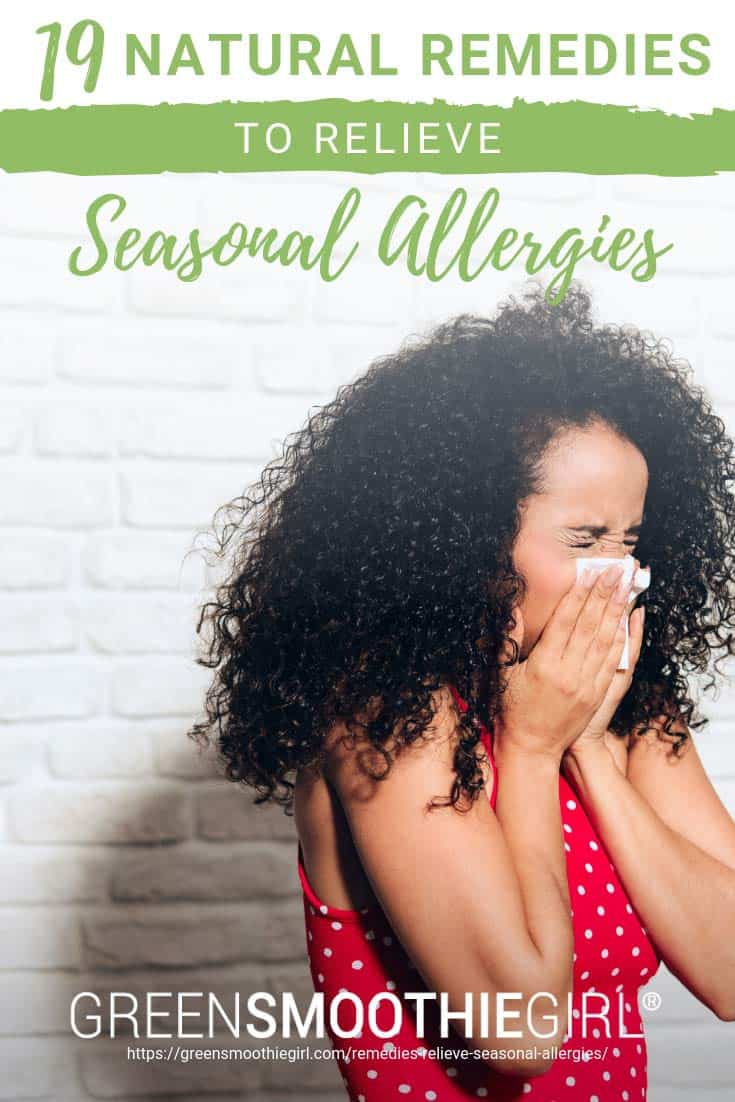
Resources
- Allergies and Hay Fever. Centers for Disease Control and Prevention. https://www.cdc.gov/nchs/fastats/allergies.htm
- Vighi, G et al. Allergy and the gastrointestinal system. Clinical & Experimental Immunology. 09/2008. https://www.ncbi.nlm.nih.gov/pmc/articles/PMC2515351/
- Guinane, Caitriona M. et al. Role of the gut microbiota in health and chronic gastrointestinal disease: understanding a hidden metabolic organ. Therapeutic Advances in Gastroenterology. 07/2013. https://www.ncbi.nlm.nih.gov/pmc/articles/PMC3667473/
- Healthy Mix of GI Tract Microbes Are Key To Preventing Allergies And Asthma. Science News. 01/2005. https://www.sciencedaily.com/releases/2005/01/050111174539.htm
- Hua, Xing. Et al. Allergy associations with the adult fecal microbiota: Analysis of the American Gut Project. EBio Medicine. 01/2016. https://www.ebiomedicine.com/article/S2352-3964(15)30221-8/abstract
- Campbell, B. et al. The effects of growing up on a farm on adult lung function and allergic phenotypes: an international population-based study. Respiratory Epidemiology. 09/2016. https://pubmed.ncbi.nlm.nih.gov/27672121/
- Winkler, John et al. Therapeutic Potential of Fulvic Acid in Chronic Inflammatory Diseases and Diabetes. Journal of Diabetes Research. 06/2018. https://www.hindawi.com/journals/jdr/2018/5391014/
- Talbott, Shawn M. et al. B-Glucan supplementation, allergy symptoms, and quality of life in self-described ragweed allergy sufferers. Food Science & Nutrition. 01/2013. https://www.ncbi.nlm.nih.gov/pmc/articles/PMC3951572/
- Micek, J. et al. Quercetin and Its Anti-Allergic Immune Response. Molecules. 05/2016. https://www.ncbi.nlm.nih.gov/pubmed/27187333
- Schapowal, Andreas. Randomised controlled trial of butterbur and cetirizine for treating seasonal allergic rhinitis. The BMJ. 01/2002. https://www.ncbi.nlm.nih.gov/pmc/articles/PMC64514/
- Bakhshaee, Mehdi. Et al. Efficacy of Supportive Therapy of Allergic Rhinitis by Stinging Nettle root extract: a Randomized, Double-Blind, Placebo-Controlled, Clinical Trial. Iranian Journal of Pharmaceutical Research. 01/2017. https://www.ncbi.nlm.nih.gov/pmc/articles/PMC5963652/
- Hay Fever and Vitamin C. https://www.seanet.com/~alexs/ascorbate/194x/holmes-hn-etal-science-1942-v96-n2500-p497.htm
- Mlcek, Jiri et al. Quercetin and Its Anti-Allergic Immune Response. Molecules. 05/2016. https://www.ncbi.nlm.nih.gov/pmc/articles/PMC6273625/
- Spencer, Michael. The Need for Balance. 09/2016. Lulu.com.
- Chatzi, Leda. et al. Protective effect of fruits, vegetables and the Mediterranean diet on asthma and allergies among children in Crete. Thorax. 08/2007. https://www.ncbi.nlm.nih.gov/pmc/articles/PMC2117278/
- Kunbootsri, N. et al. The effect of six-weeks of sauna on treatment autonomic nervous system, peak nasal inspiratory flow and lung functions of allergic rhinitis Thai patients. Asian Pacific Journal of Allergy & Immunology. 06/2013. https://www.ncbi.nlm.nih.gov/pubmed/23859414
Posted in: 12 Steps To Whole Food, Detox, Health Concerns, Natural Remedies, Supplements












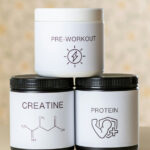

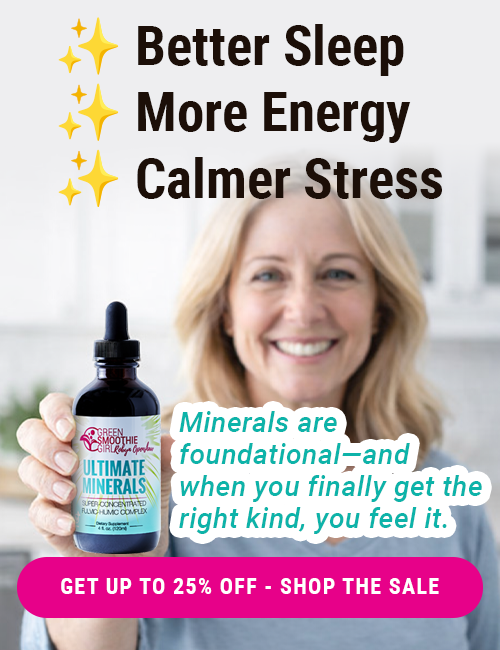

My allergies are considered year round but I do sometimes have flair ups when the seasons change. I have itchy dry eyes. My nose feels stuffed 24-7. The Neti Pot didn’t do anything for me. Nasal sprays basically just open up my passages enough so I can sleep at night.